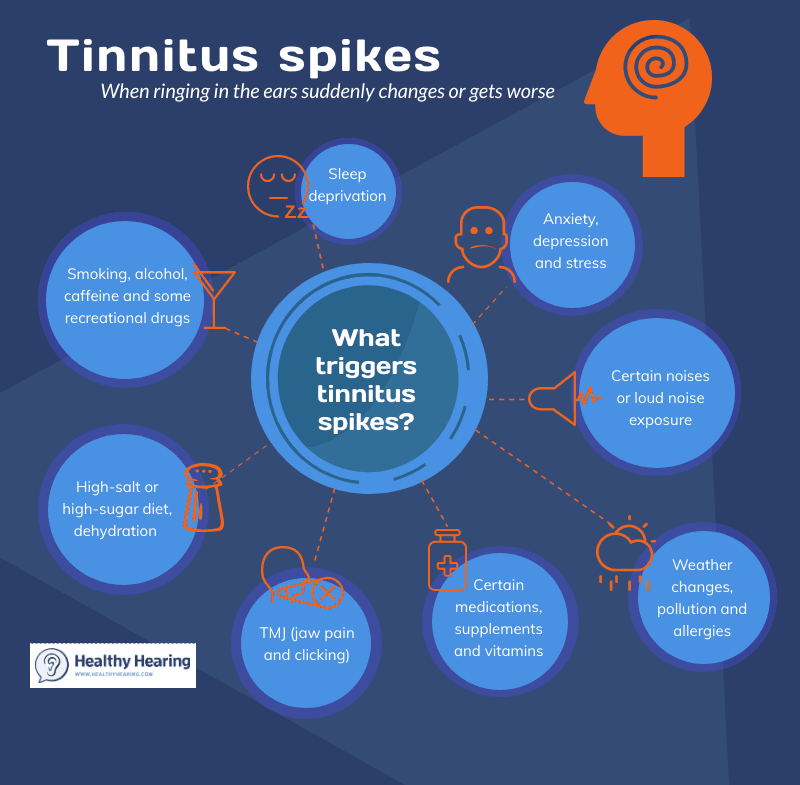|
www.HealthyHearing.com |
Tinnitus spikes: solving a difficult problemWhy they happen and what to do about them
Contributed by Glenn Schweitzer When you live with tinnitus–the medical term for ringing in the ears–the sound never stops, but it rarely remains consistent. For a lot of different reasons, your perception of the sound can fluctuate. Occasionally it changes for the better. But more often than not, the sound changes in a way that temporarily intensifies suffering. This is known as a tinnitus spike. What is a tinnitus spike?
Most patients think of a tinnitus spike as an increase in volume or intensity, but it can be also be a change in tone, pitch, or sound that makes it harder to ignore. It can be the sudden appearance of new sounds, or it can just be a period of time where it’s more bothersome, intrusive, or anxiety provoking – even if the sound didn’t actually change at all. All of these different types of tinnitus spikes can last for minutes, hours, or even days or weeks. Regardless of how a tinnitus spike occurs, they are some of the most difficult challenges a tinnitus patient must face on a regular basis. And for most sufferers, these kinds of fluctuations are simply unavoidable. The good news is that spikes are not a sign that you’ve gone undone any progress you’ve made in learning to live with tinnitus. Spikes are an unavoidable part of the habituation process that everyone must endure as they work to find lasting relief. Once you understand the underlying psychology and nature of tinnitus spikes, you can learn to not just better cope in the moment, but to become more confident and resilient against the difficult moments yet to come on your journey. What causes tinnitus spikes and why is it so difficult to figure out?
When a tinnitus sufferer experiences a spike, it can often feel random, but it was likely caused by some combination of internal or external factors. The problem is that it’s always very difficult to figure out what caused a spike to occur. For most tinnitus patients, stress, anxiety and sleep deprivation are the biggest factors. The vicious cycle of tinnitus always starts with a fight or flight stress reaction in the nervous system, and so additional stress or anxiety will always make tinnitus worse, while sleep deprivation will exacerbate any health problem, tinnitus or otherwise. But beyond the big three, every case of tinnitus is unique to such an extent that some specific triggering element for one person (be it dietary, environmental, or otherwise), could be something that improves tinnitus for someone else. Common tinnitus triggers include:
How long does a tinnitus spike last?This will vary for everyone, but generally within a couple of days. If your tinnitus was triggered by loud noise, it's critical to rest your ears so you don't cause further damage to your hearing. A tinnitus tracker is essentialKeeping track of possible (common) triggers in a daily journal is always helpful. If you can identify triggers, you can eliminate these factors with lifestyle changes, and that can smooth out the up and down emotional rollercoaster ride. But even if you take meticulous notes on all aspects of your diet, lifestyle, and environment, you still may not ever be able to find a pattern. The math equation for tinnitus spikes often just has too many variables to consider. And trying to figure it all out can just end up being another source of frustration and anxiety. Luckily, identifying tinnitus triggers is not necessary for coping, or even for habituation to occur. If you never figure out what causes your tinnitus to spike, you can still find lasting relief from your tinnitus. Tinnitus spikes in the context of habituationWhen you are actively suffering from tinnitus, there is a lot more going on than just the perception of a sound that other people cannot hear. Human beings are fully capable of tuning out and ignoring meaningless sounds and other sensory perceptions with a mental process known as habituation. It happens unconsciously, all the time. It’s how you can easily have a productive conversation in noisy environments – your brain automatically filters out the background noise from your conscious awareness. The problem is that we are unable to ignore any sounds that our brain or nervous system thinks might be the sound of something dangerous, problematic, or threatening. It’s a helpful evolutionary adaption. You would never want to be able to ignore the sound of anything actually dangerous. So instead of ignoring the sound of our tinnitus, we end up reacting with a fight or flight stress response that doesn’t ever fully end because the tinnitus doesn’t go away. And over time, it can get worse as the emotional and psychological effects of tinnitus – the anxiety, negative thoughts, hopelessness, panic, frustration, and anger – continuously accumulate until our nervous system is hijacked into a constant state of over agitation and anxiety. Fortunately, you can work to change your emotional, psychological, and physiological reaction to the sound of your tinnitus, and when you do, you can get to a point where you are no longer aware of your tinnitus most of the time, even if it never goes away – just like how you rarely ever feel your clothing against your skin. But habituation takes time regardless of the strategy, and it’s not an “every day is a little better than the day before” sort of process. It’s often three steps forward and two steps back.
And even if you do everything perfectly as you work to habituate, spikes are an unavoidable and expected part of the process. Why spikes are unavoidable (and so challenging)The first thing you need to understand is that if your tinnitus is spiking, you haven’t done anything wrong, and you also haven’t erased any progress you’ve made if you’ve been working to habituate. Your progress is only ever on hold in these moments, though it will almost always feel like you’ve taken many steps backward. Here is a helpful analogy to better understand why this occurs. Ever since I was diagnosed with Meniere’s disease and tinnitus, I’ve made personal growth and development a priority. I’ve been in therapy for years, I read constantly, I meditate and exercise daily, and I’m of service to others. I actively try to improve myself on a daily basis, and I like to think that it’s reflected in the way I act around my friends and colleagues. But then I’ll go to visit my parents and brothers in my childhood home, and if (read: when) we all get into an argument at dinner and everyone starts getting on my case about something unimportant, I’ll suddenly feel like I’m 13 years old. It’s as if all my years of hard work on myself just flies out the window as I react emotionally, and we all yell over one another. Spikes and setbacks are unavoidableThis happens because the emotional and behavioral patterns and programming of my childhood are carved deep into the neural pathways of my brain, and so who can push my buttons to activate these old patterns quite like the people who installed these buttons in the first place? Of course, once the argument ends, we all get along fine as if nothing ever happened. I didn’t actually regress into childhood. But this is very similar to what is happening on an emotional and psychological level during tinnitus spikes, and why it can be so difficult to cope: The negative emotional and psychological patterns associated with bothersome tinnitus (like fear, anxiety, powerlessness, and hopelessness) will almost always be triggered as well. The most important thing to understand is that spikes and setbacks are unavoidable, but also not a sign that you’ve gone backwards. It may feel like you’re back to square one, but you’re not. Your progress with habituation is simply on hold until the spike passes. Coping with tinnitus spikes: Focus on what you can controlSo what exactly should you do to cope when your tinnitus is spiking? To understand what you have the power to control during spikes, you first need to understand what you can’t change or control. Most tinnitus sufferers cannot change the volume of their tinnitus in any meaningful way when it’s spiking, nor can they ignore the sound by force of will alone. Trying to actively ignore a sensory perception is an act of giving it attention. Here’s a quick example: Whatever you do, do not think about, or pay attention to the feeling of the collar of your shirt against your neck. You couldn’t help it, could you? You also can’t control how long a spike is going to last, or the emotions and thoughts that arise as it’s happening. The thoughts and emotions will flood in, and you can’t always just think your way out of it. Activate your other sensesThe best thing you can do is to try to catch yourself quickly when the spike first starts, and then focus all of your energy on the one thing you can actually control: Using as many coping tools as you can. No matter what is happening, no matter how loud or difficult the spike has become, we can always take coping actions to make ourselves more relaxed, calm, comfortable, or distracted. We can also turn on various types of background noise to mask the sound a bit. You can also use more than one tinnitus coping tool at a time. In fact, the success or failure of your ability to distract yourself is strongly correlated with the amount of other sensory perceptions available in the moment. In other words, the more senses you can activate when you cope, the better the distraction. Additional resources on tinnitus coping strategies:
Limitations on successful coping during spikesThe biggest challenge you will face in coping with spikes is that no matter how perfectly you use your coping tools, you will almost always still have to endure some degree of discomfort. It’s helpful to think about the intensity of your tinnitus-related suffering on a scale of 1 to 10, 10 being the worst. If you are experiencing a severe tinnitus spike and your suffering is at a 10 out of 10, there is very little chance of getting that number down to zero. For example, putting on background noise for masking is always helpful, though it will likely only take the edge off bringing you down 2-3 points at most. With masking alone, you are still at a consistent 7 or 8 out of 10. So you add in other tools as well, like breathing techniques, and mental and physical relaxation techniques. You may try to distract yourself by seeing friends, playing a game, or getting some exercise, each subtracting a few additional points off the scale. Through it all, you may only get that number down to a 5, and a 5 out of 10 on the suffering scale likely still involves a significant degree of discomfort. It’s also always exhausting to have to put so much energy into coping just to get through the day. But I can tell you from personal experience, a day spent at a consistent suffering level 5 is much better than being stuck at a level 10. It’s always worth the effort. The spike will pass eventually–they always do – and your suffering will ease, just like it has every other time. Overcoming tinnitus spikes makes you resilientIn my work as a tinnitus coach, I’ve come to realize something quite counterintuitive after working with nearly 600 tinnitus sufferers one-on-one: Tinnitus spikes are not just unavoidable, but a necessary and important part of the habituation process. In fact, if there was a habituation strategy where spikes never occurred and every day was magically better than the day before (there isn’t one currently), I would choose not to teach it. Every difficult tinnitus spike you successfully endure and overcome increases your self-confidence in your ability to cope, which in turn makes you more resilient to future spikes. When a tinnitus spike occurs, most sufferers panic and start to fear that they have regressed right back to where they started. The negative emotional and psychological patterns surrounding their tinnitus reactivate too, so even if they’ve been coping much better overall – their suffering in the moment may actually feel as bad as it did in the early days. Terrible negative thoughts tend to arise in these moments as well. During difficult spikes, many patients think, “What if it stays like this? How am I going to live like this?” Your blood pressure likely increases, as well as your heart rate. But if you know you can get through a difficult spike and fully bounce back because you’ve been through it many times before, then when it happens again, you will not need to convince yourself that you are able to cope. It’s the antidote to the panicked, negative thoughts that will inevitably arise. When you have confidence in your ability to cope effectively and recover, the panic ends abruptly. If you're finding this tough to do on your own, you may want to seek out cognitive-behavioral therapy for tinnitus. Research shows it can be very effective at reducing the emotional impact of tinnitus and providing you with better coping tools. Finding confidence in your ability to copeIt’s not just a short-term strategy, either. This kind of self-confidence is also important for living well with tinnitus over a lifetime because life happens, and we can’t always protect ourselves. Even after successful habituation, where tinnitus no longer impacts your quality of life, future spikes are always possible. You never know when you’ll be hit by a loud sound you weren’t protected against. Traumatic events, illness, medication side effects, and injury can all cause tinnitus spikes, too. When this happens, it’s possible to have a tinnitus “relapse” where you fall out of habituation, and the vicious cycle starts to ramp back up again. But if you have confidence in your ability to cope with spikes, and you can catch yourself quickly when they first occur, you can prevent panic, focus on coping, and remain habituated when it’s over. Get help for tinnitusAs horrible as tinnitus spikes can be to endure, you can learn a lot from the experience of overcoming this kind of adversity. Your worst spikes will always pass eventually, and if you can remain calm and cope effectively, you will come out the other side a little stronger and more resilient than you were before. It will never be easy, but effective coping is always possible, and so is habituation. No matter how bad things may seem in the moment, there is always hope. Are you experiencing ringing in your ears? If so it's important to get a thorough hearing evaluation from a hearing care professional as tinnitus and hearing loss often occur in tandem. Find an audiologist that specializes in tinnitus treatment near you by visiting our directory of hearing care providers. Please note that not all hearing clinics treat tinnitus, so you may need to browse several clinic pages to find the right provider. Glenn Schweitzer
|
Featured clinics near me
Earzlink Hearing Care - Reynoldsburg
7668 Slate Ridge Blvd
Reynoldsburg, OH 43068

Find a clinic
We have more hearing clinic reviews than any other site!



 Glenn Schweitzer is an entrepreneur, blogger, and the author of Rewiring Tinnitus and Mind over Meniere’s. He is passionate about helping others who suffer from tinnitus and vestibular disorders and volunteers as an Ambassador Board Member for the Vestibular Disorders Association (VEDA). Through his blogs, he continues to raise awareness for tinnitus, Meniere’s disease, and other vestibular disorders, spreading his message of hope to those in need.
Glenn Schweitzer is an entrepreneur, blogger, and the author of Rewiring Tinnitus and Mind over Meniere’s. He is passionate about helping others who suffer from tinnitus and vestibular disorders and volunteers as an Ambassador Board Member for the Vestibular Disorders Association (VEDA). Through his blogs, he continues to raise awareness for tinnitus, Meniere’s disease, and other vestibular disorders, spreading his message of hope to those in need.